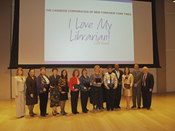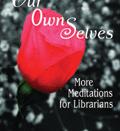In the article titled ÃÂConqueror Bookworm,ÃÂ published in an issue of American Libraries, author David Majka begins his article by presenting an issue to the readers using a strong, almost angry tone. Majka invites the idea that libraries are being threatened due to people not understanding how to conduct proper research. Majka also discusses the growth of the issue dealing with the amount of digital sources people are using to find information. In his article, Majka idealizes that people are becoming lazy; therefore, he poses that there is a threat facing librarians and their jobs. Towards the end of the article, Majka begins to present a solution to the librarians in order to save their job, such as, better marketing of the importance of the librariansÃÂ jobs. He states librarians need to work harder to steer people away from digital sources.
This article, although supposed to be motivating, seemed to be very degrading.
There was much about the article that would upset me if I were a librarian to whom he was directing this towards. MajkaÃÂs ideas were much too general, the tone was unnecessarily offensive, and I feel his solution does do justice to the ideas he portrays throughout the article.
In my opinion, MajkaÃÂs article is much to general: ÃÂÃÂ we are doing a rotten job of reinforcing the reality and of defending scholarship, the prime reason for our existenceÃÂ (63). It is to be stated that there are obviously a few librarians, though it may not be many, that are trying to stray away from this problem. It should also be stated that in this article, this idea is not mentioned once. He talks to the librarians as if they are just one collective person. ÃÂWe will not win by converting one bibliographic instruction class at a time, or by sitting around waiting for the masses to come to usÃÂ ÃÂ (62). This, to me, is saying that all librarians try the same thing and no one tries to be different. Nothing in this world is one sided. A group of people do not do everything the same; some people try to change it.
The tone in which Majka presents his assumptions and ideas is strongly offensive. If I were a librarian reading this article, I would most likely take offense to it. Majka reiterates the idea that he thinks librarians are, for the lack of a better phrase, lazy and the cause of this poor research epidemic. He at one point states that librarians ÃÂcould hardly be doing a worse job of defending our franchise in the face of this disturbing situationÃÂ (63). He also, at one point, uses harsh rhetorical questions: ÃÂWhy do we need you? Why Should we continue to support you?ÃÂ (63).
Majka, after putting down every librarian, presented a solution to this issue. However, I feel it is poorly thought out and was no different than some of the issues that he discussed earlier in the article. MajkaÃÂs solution is ÃÂtell[ing] the world the good news about the wealth of resources and assistance that we have to offer in the transition to the Information AgeÃÂ (63). He believes that librarians ÃÂneed to get out and advertise what [they] do and why [their] services are more important than ever, and we need to do it in mass mediaÃÂ (63). To me, that seems to be a very poorly thought out idea. He has all these problems with librarians, and the solution he presents is nothing more than advertising more? It seems that if he feels so strongly about the issue at the hand, I would think there would be a more complex solution to solve such an intricate problem.
Overall, I feel the message David Majka was trying to get across was a good one. It is apparent that there is an issue regarding how people go about research; however, I feel that he went about it at a completely obscene angle. He was much to general about his comments towards, and about, librarians; his solution seemed to be too simple for such a problem, and the tone used throughout most of the article was absurd. Although his intentions were to show the problem at hand, I would have found this article to be rude and degrading.
I do not have the citing for the paper, it wasn't needed. If bibliography is needed - Conqueror Bookworm by David Majka. American Libraries. June/July 2001. Pages 61-63.





